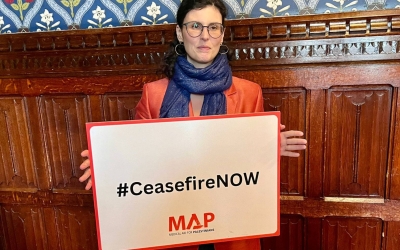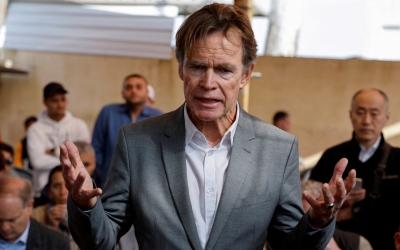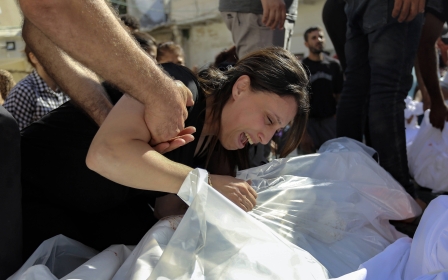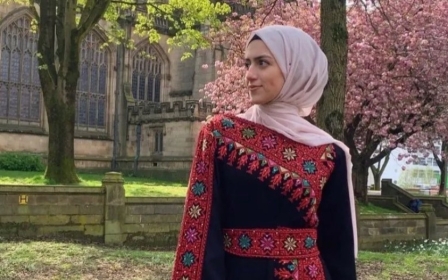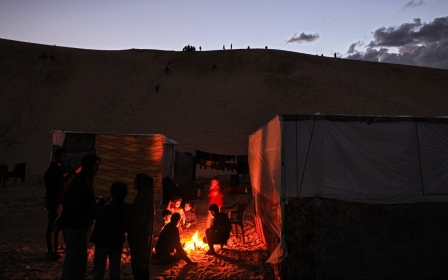'Neglected and abandoned': British-Palestinians fight to bring family from Gaza to UK
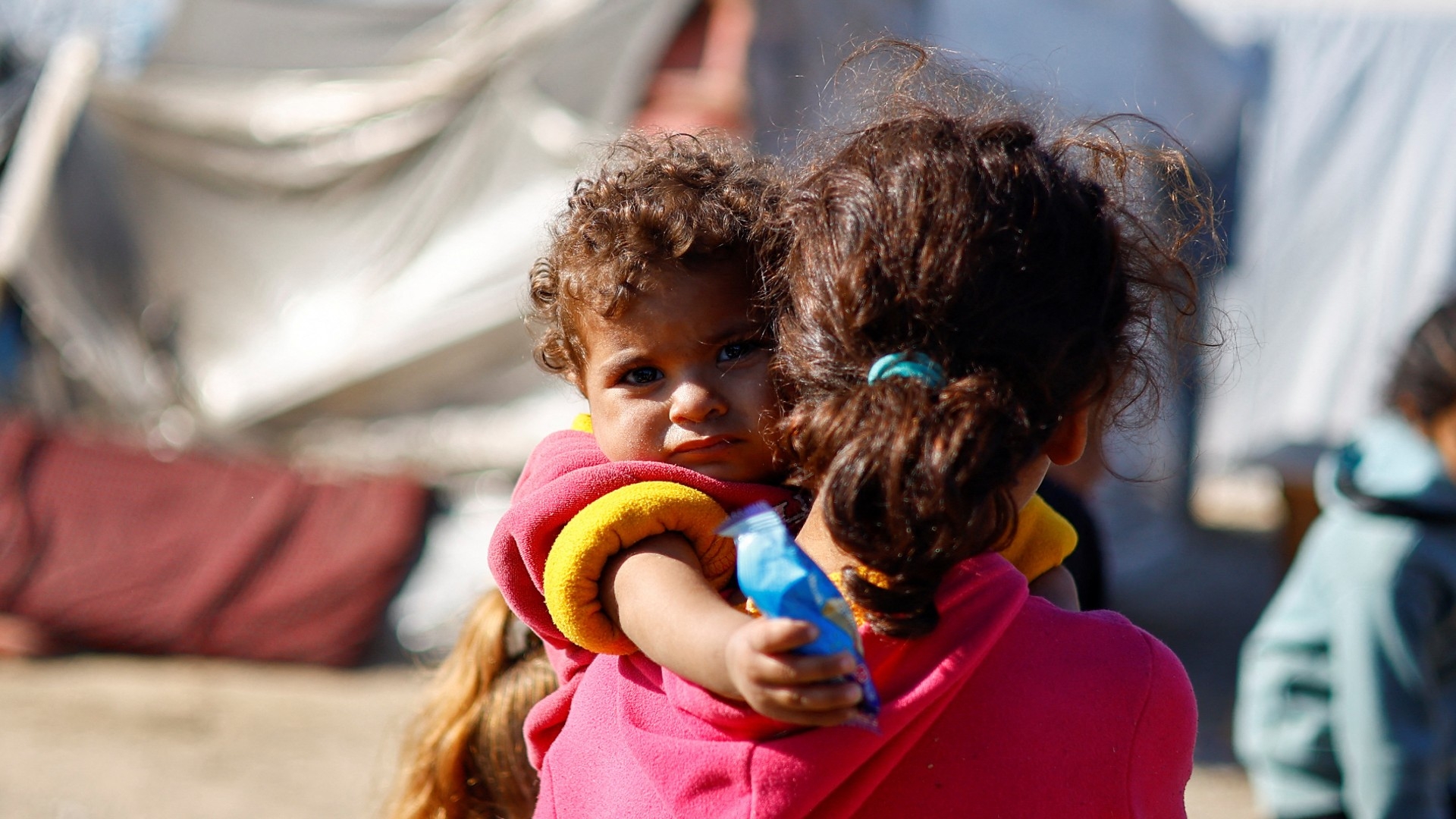
Yusuf, a British-Palestinian, has not heard from his parents and siblings in Gaza for five days.
Contact with them over the last few months has been disrupted by frequent blackouts, which can last for days at a time.
The most recent outage has been the longest, and the most agonising.
“If I could at least hear from someone who could reassure me they are ok, it would keep me going," he told Middle East Eye, adding: “These have been the worst three months of my life.
“It’s beyond imagination...I feel helpless.”
New MEE newsletter: Jerusalem Dispatch
Sign up to get the latest insights and analysis on Israel-Palestine, alongside Turkey Unpacked and other MEE newsletters
Yusuf, who did not wish to share his surname, explained that his family were forced to flee after the house they had built was flattened in Israeli air strikes on Khan Younis in southern Gaza.
“They have been fleeing from day one…I believe they’ve moved five times,” he said.
Yusuf’s anxieties are further exacerbated by his father's medical issues. The 71-year-old is suffering from kidney failure and was due to get treatment in Egypt just before the current Israeli assault began after 7 October.
When Israel cut off routes into and out of Gaza, he could no longer travel out of the besieged territory.
Follow our live blog for all the latest on the Israel-Palestine war
“They don’t have access to clean water, there is no electricity,” Yusuf told MEE. “They didn’t have any proper protein for weeks until they managed to find some eggs a few weeks ago.”
“I feel that my father is close to dying…his life has been shortened for sure. The question now is will I be able to see him again or not?” he said.
“It just kills me that his kidneys are failing every day, which can still be avoided.”
An unprecedented situation
Despite being a British citizen, Yusuf is struggling to bring his family over to the UK.
Lacking a Ukraine style visa scheme, British nationals wishing to bring their Palestinian relatives to the UK must apply through existing family visa routes, which are prolonged, costly and often exclude siblings, parents of adult children and extended family.
'I think I’ve been let down…it’s not complex what we are asking for'
-Yusuf, British-Palestinian
Existing visa guidelines mean Yusuf’s parents would have to submit biometrics, which can only be done from Egypt.
The UK government has said that they are currently not evacuating anyone from inside Gaza.
When Yusuf contacted the Foreign, Commonwealth and Development Office (FCDO) in October, he was informed that if he was in Gaza with his parents, they would have tried to facilitate their passage to Egypt.
“They said, since you’re not there, we can’t do anything.” Yusuf told MEE.
If Yusuf’s family reached the Rafah crossing, they would need to have their names added to a list at the border to pass through.
The FCDO directed Yusuf to his local MP, who he contacted repeatedly often with no response. After two months of emails, they finally granted him a surgery appointment.
“I think I’ve been let down…it’s not complex what we are asking for,” he said.
“The least that could and should be done [is to facilitate] people going to Egypt for biometrics,” he said.
"They're using the current available [visa] schemes, not a different route. And then at least my father could have some treatment even in Egypt if needed. “
Neglected and abandoned
Ghassan Ghaben, a Palestinian resident in the UK, has also been trying to bring his mother and siblings over.
“It will take a really long time to go through the current guidance,” he said.
“This situation is unprecedented, all we are seeking is just to bring them to safety,” Ghaben told MEE.
Ghaben and Yusuf are part of a 200-strong group of Palestinian residents in the UK who formed a Whatsapp group in the days following the launch of Israel’s ongoing onslaught on the besieged Gaza Strip.
They all share their sense of powerlessness and are grappling with the labyrinthine and costly UK family visa routes to reunite with their families, in the absence of any bespoke scheme to ease the process.
Repeated appeals to Prime Minister Rishi Sunak and Foreign Secretary David Cameron to implement such a scheme have been rebuffed.
Despite garnering over 28,000 signatures, their parliamentary petition requesting a Ukraine-style visa scheme that would waive fees, salary thresholds and language tests for Palestinians in Gaza to reunite with family in the UK was rejected.
In response to the petition, the government said: “There are no plans to introduce bespoke arrangements for people arriving from the region. Those wishing to come to the UK who currently have no visa can apply under one of the existing visa routes."
“This is really devastating, and each one of us feels neglected and abandoned by the government,” Ghaben said.
Ukraine-style scheme
The Ukraine Family Scheme was set up within weeks of Russia’s invasion in 2022 to allow people fleeing the war in Ukraine to join family members in the UK.
Under the scheme, the government waived all fees, salary thresholds and language tests, with eligibility extended to parents, grandparents, adult offspring, siblings, and their immediate family members.
Without a similar track, British-Palestinians face prolonged waits and a hefty fee of £1,846 to apply to bring each family member to the UK, and a further £1,560 healthcare surcharge for adults, or £1,175 for children.
They must also meet a minimum salary threshold of £18,600 to apply for a visa for a spouse or partner, set to rise to £29,000 in February.
The extortionate fees have driven some British-Palestinians to launch fundraising campaigns to sponsor family members’ applications.
“There’s no other guidance beyond the current guidance or support to get our families out of this situation,” Ghaben told MEE.
“Most of us have already lost family members and we are hoping that we are not going to lose more,” he said.
Middle East Eye delivers independent and unrivalled coverage and analysis of the Middle East, North Africa and beyond. To learn more about republishing this content and the associated fees, please fill out this form. More about MEE can be found here.


